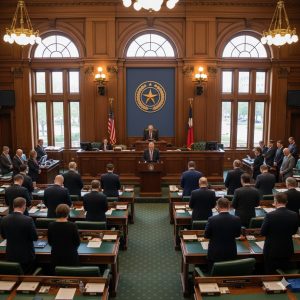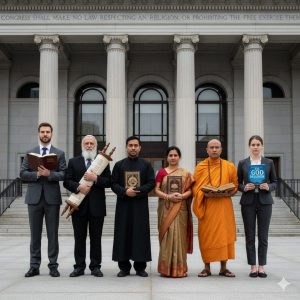
The conscience is often regarded as the innermost sanctuary of the individual, a place where our moral reasoning and divine conviction intersect. While it is true that one’s conscience may not always be correct—fallible as it is due to human nature, false teaching and societal influences—it remains the most sacred part of the person and must be protected. From a Christian perspective, this protection is not merely a matter of individual freedom but a divine mandate that is grounded in Scripture.
The Conscience in Scripture
The Bible indeed places significant emphasis on the conscience, portraying it as a critical, God-given faculty that informs moral decision-making and serves as an internal guide to righteousness. Paul’s epistles, among other scriptural passages, highlight the role of the conscience in aligning human actions with divine principles. These verses support the thesis that the conscience, though fallible, is a sacred part of the individual that must be respected and nurtured.
Romans 2:15: The Law Written on the Heart
Paul writes in Romans 2:15:
“They show that the requirements of the law are written on their hearts, their consciences also bearing witness, and their thoughts sometimes accusing them and at other times even defending them.” (NIV)
This passage emphasizes that even those who have not received the Moral Law (Gentiles) possess an intrinsic moral compass, given by God. Their conscience serves as evidence of this universal moral awareness, a reflection of divine law written on their hearts. Paul’s statement affirms the universality of the conscience as a guide to moral behavior, independent of cultural or religious instruction.
1 Timothy 1:5: A Good Conscience as the Goal of Christian Teaching
Paul further elaborates in 1 Timothy 1:5:
“The goal of this command is love, which comes from a pure heart and a good conscience and a sincere faith.” (NIV)
Here, Paul outlines the ultimate aim of Christian instruction: cultivating love that arises from three interconnected sources—a pure heart, a good conscience, and sincere faith. The conscience is highlighted as integral to the development of genuine Christian character, and when guided by Scripture and the Holy Spirit, it leads to righteous living. A “good conscience” implies one that is informed by God’s Word, free from guilt, and aligned with truth. True godly love can only be exercised if the conscience is respected and free.
Yet, Scripture also warns of the fallibility of the conscience. Paul speaks of those whose consciences have been “seared as with a hot iron” (1 Timothy 4:2), indicating the capacity for the conscience to be corrupted. However, the possibility of error does not negate its sanctity. Instead, it Paul emphasizes the need for individuals to nurture their conscience through prayer, study, and communion with God.
Historical Precedence: The Reformation Era and Later Religious Liberty in America
Throughout history, the protection of conscience has been at the heart of struggles for religious liberty. Martin Luther’s stand at the Diet of Worms in 1521 exemplifies this principle. When commanded to recant his teachings, Luther famously declared: “My conscience is captive to the Word of God. I cannot and will not recant anything, for to go against conscience is neither right nor safe.” His words reflect a profound Christian truth: the conscience, bound to God’s Word, must remain free from coercion.
In The Papers of James Madison 14:266–68 on 29 Mar. 1792 in the section “Property” James Madison wrote,
Conscience is the most sacred of all property; other property depending in part on positive law, the exercise of that, being a natural and unalienable right. To guard a man’s house as his castle, to pay public and enforce private debts with the most exact faith, can give no title to invade a man’s conscience which is more sacred than his castle, or to withhold from it that debt of protection, for which the public faith is pledged, by the very nature and original conditions of the social pact.
His efforts laid the groundwork for the American tradition of religious liberty, a principle that was codified in the First Amendment to the U.S. Constitution, adopted several months earlier.
Protecting Conscience in a Pluralistic Society
In today’s pluralistic world, the sanctity of conscience remains a cornerstone of freedom. However, it is increasingly under threat from societal pressures, church and governmental overreach. Laws and policies that compel individuals to act against their deeply held beliefs—whether in matters of faith, ethics, or personal conviction—violate this sacred space.
From a Christian perspective, the conscience is not merely to be a personal guide but a reflection of God’s sovereignty over the individual. To protect conscience is to honor the Creator, who has endowed every person with the ability to discern right from wrong. Religious Pluralism in this context does not mean that all consciences are equally correct or that every conviction is valid. Rather, it argues that coercion in matters of belief undermines the dignity of the individual and the moral fabric of society.
The Fallibility of Conscience and the Role of the Church
Acknowledging the fallibility of conscience does not diminish its sacredness. Christians believe that the conscience must be informed and transformed by Scripture and the Holy Spirit. The role of the church is critical in this process, providing guidance, accountability, and community for individuals seeking to align their conscience with God’s will. What the church is not to be, however, is a political lobby group lobbying for the government to enforce its moral ideals. The temptation to become that lobbying group is strong in a day and age where morality seems to be degrading with the passing of time.
However, even when the conscience errs, it must be treated with respect. Coercion does not correct a misguided conscience; it hardens it. Ellen G. White, who Seventh-day Adventists believe wrote with prophetic authority wrote, “…God never compels the will or the conscience.” (Signs of the Times, October 1, 1894) True change comes through conviction and spiritual persuasion, not force.
The Dangers of Neglecting Conscience
History is replete with examples of what happens when conscience is ignored or suppressed. From the Inquisition to totalitarian regimes, efforts to impose conformity have led to unspeakable suffering and moral decay. Conversely, societies that uphold the freedom of conscience tend to flourish, as individuals are free to contribute their unique perspectives and talents.
A Call to Action
For Christians, protecting the conscience, even of those they disagree with, is both a personal duty and a collective responsibility. This involves:
- Advocating for Religious Liberty: Support policies and initiatives that safeguard the right of every individual, not just those who believe as you do, to live according to their beliefs.
- Respecting Differences: Recognize that others may hold convictions different from your own and engage in dialogue with humility and grace.
- Nurturing Your Own Conscience: Spend time in prayer and Scripture, seeking God’s guidance to align your conscience with His will.
Conclusion
Any given person’s conscience may not always be right, but it is still sacred. Protecting it is essential for preserving individual dignity, encouraging societal harmony, and honoring God’s design. In a world that often seeks to impose uniformity, let us champion the freedom of conscience as a testament to the value of the individual whom our Creator gave His life for.


